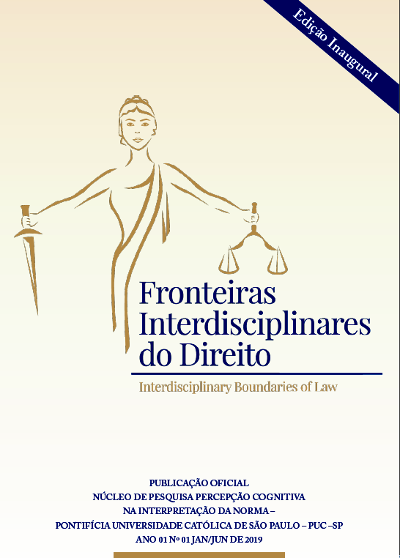Be right back - a incidência do direito no pósmortem e o reflexo obscuro da sociedade digital
Palavras-chave:
DIREITO DE PERSONALIDADE NO PÓS-MORTEM, SOCIEDADE VIRTUAL, REVOLUÇÃO MIDIÁTICA, LUTO E TRANSCENDÊNCIA ARTIFICIAL, GARANTIA DOS DIREITOS HUMANOSResumo
O objetivo do presente trabalho é discorrer, pela primeira vez no âmbito acadêmico, o direito de personalidade – matéria consagrada no Direito Civil – no âmbito do pós-mortem, com base no enredo apresentado na ficção científica Black Mirror, especialmente no episódio “Be Right Back” (S02E01). Inicialmente, se busca visualizar a lacuna normativa gerada com a influência da revolução midiática, processo no qual se permite – a partir da transcendência artificial – a criação mecânica da presença ficta de alguém já atestada mente morto, sem seu prévio consentimento em vida. Ademais, por meio de uma análise psicológica do luto, serão tratados os efeitos da exploração das relações virtuais na construção do pós humano, num contexto de arte digital que procura imitar algo juridicamente extinto em razão da morte – no caso, a personalidade jurídica. Pretende-se criar uma intersecção entre o mundo cibernético, Bioética e a criação de laços afetivos organicamente inexistentes, com o fito de se concluir qual seria o melhor sistema que assegure a garantia dos direitos humanos no cenário do pós-mortem.
Referências
ALARCÓN, Pietro de Jesús Lora. Patrimônio genético humano: e sua proteção na Constituição Federal de 1988. São Paulo: Método, 2004.
BAUDRILLARD, Jean. Simulacros e Simulação. Lisboa, Relógio d'Água, 1994.
BAUMAN, Zygmunt. Modernidade Líquida. Tradução: Plínio Dentzien. Rio de Janeiro: Zahar, 2015.
BOWLBY, John. Perda, tristeza e depressão. V. 3 da trilogia Apego e Perda. São Paulo. Martins Fontes, 1985.
BRASIL. Código Civil. Lei nª 10.406, de 10 de janeiro de 2002. Congresso Nacional, 2002. Disponível em <http://www.planalto.gov.br/ccivil_03/leis/2002/L10406.html>. Acesso em: 25.03.19.
BRASIL. Código Penal. Decreto lei. nª 2.848 de 7 de dezembro de 1940. Presidente da República, 1940. Disponível em <http://www.planalto.gov.br/ccivil_03/decreto-lei/Del2848compilado.html> Acesso em: 25.03.19.
BRASIL. Constituição da República Federativa do Brasil. Brasília. DF: Senado Federal, 1988. Disponível em <http://www.planalto.gov.br/ccivil_03/constituicao/constituicaocompilado.html>. Acesso em: 25.03.19.
BRASIL. Lei de Biossegurança. Lei nº 11.105, de 24 de março de 2005. Diário Oficial [da] República Federativa do Brasil, Brasília, DF, 2005. Disponível em: <http://www.planalto.gov.br/ccivil_03/_Ato2004-2006/2005/Lei/L11105.htm>. Acesso em: 25.03.19.
BRASIL. Ministério da Saúde. Conselho Nacional de Saúde. Resolução nº 196, de 10 de outubro de 1996. Dispõe sobre diretrizes e normas regulamentadoras de pesquisas envolvendo seres humanos [online]. Disponível em <http://conselho.saude.gov.br/resolucoes/1996/Reso196.doc> Acesso em: 25.03.19.
BROOKER, Charlie. Black Mirror. Be Right Back (“Volto já”), 2013.
DECKERS, Jan. Why current UK legislation on embryo research is immoral: how the argument from lack of qualities and the argument from potentiality have been applied and why should be rejected. Bioethics. 2005.
HOCHEDLINGER, Konrad. e JAENISH, Rudolf. Nuclear Transplantation, Embryonic Stem Cells and the Potential for Cell Therapy. N. Engl. Journal of Medicine, 349:275-212, 2003.
HANAFIN, Patrick. Gender citizenship and human reproduction in contemporary Italy. Fem Leg Stud. 2006.
HOGEMANN, Edna Raquel Rodrigues Santos. Conflitos Bioéticos – O Caso da Clonagem Humana. Rio de Janeiro: Editora Lúmen Juris, 2003.
KOVÁCS, Maria Júlia. Morte e desenvolvimento. São Paulo: Casa do Psicólogo, 1992.
KÜBLER-ROSS, Elisabeth. Sobre a morte e o morrer: o que os doentes têm para ensinar aos médicos, enfermeiras, religiosos e aos seus próprios parentes. São Paulo: Martins Fontes, 1996.
MORIN, Edgar. O homem e a morte. Portugal (PT): Biblioteca Universitária, 1978.
PARKES, Colin Murray. Luto: Estudos sobre a perda na vida adulta. São Paulo: Summus, 1998.
PASSOTI, Jacopo e STAFFORD, Ned. It's legal: Italian researchers defend their work with embryonic stem cells. Nature. 2006.
PRAINSACK, Barbara. 'Negotiating life': the regulation of human cloning and embryonic stem cell research in Israel. Soc Stud Sci, 2006.
RHIND, S. M.; TAYLOR, J. E.; DE SOUSA, P. A.; KiNg, T. U. I.; MCGARRY, M. e WILMUT, I. Human Cloning: Can it be Made Safe?. Nature Reviews, 4:855-864, 2003.
SANTAELLA, Lúcia. Pós-humano por quê? Revista USP, São Paulo, n. 74, 2007.
SANTOS, Maria Celeste Cordeiro Leite. Clones, Gens e Imortalidade. São Paulo: Revista Bioética, nº 18, 2001.
STF. ADIn nº 3.510 DF. Relator Min. Carlos Britto. DJe: 27/05/2010. JusBrasil, 2010. Disponível em: <https://stf.jusbrasil.com.br/jurisprudencia/14720566/acao-direta-de-inconstitucionalidade-adi-3510-df>. Acesso em: 25.03.19.
TARIFA, R. de C.R / UNOPAR. Direito à Integridade Moral – alguns aspectos do Direito de Personalidade. Cient., Ciênc. Jurid. Empres., Londrina, 2003. Disponível em <http://www.planalto.gov.br/ccivil_03/decreto-lei/Del2848compilado.htm> Acesso em: 25.03.19.
VENOSA, Sílvio de Salvo. Direito Civil: Parte Geral. 13ª Ed. São Paulo: Atlas, 2013.
WARNOCK, Mary. Report of the Committee of Inquiry into Human Fertilisation and Embriology. London: Department of Health and Social Security, 1984.
WORDEN, William J. Terapia do luto: Um manual para o profissional de saúde mental. Porto Alegre. Artes médicas, 1998.
ZIZEK, Slavoj. O amor impiedoso (ou: Sobre a crença). Tradução Lucas Mello Carvalho Ribeiro. Belo Horizonte: Autêntica, 2013.
Downloads
Publicado
Como Citar
Edição
Seção
Licença
Copyright (c) 2019 Laleska Rigatto Walder

Este trabalho está licenciado sob uma licença Creative Commons Attribution 4.0 International License.


